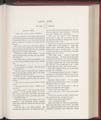
stnic.189008.001.001.jpg
Lady Jane.
CHAPTER XIII.
LADY JANE FINDS A MUSIC TEACHER.
ON the occasion of Lady Jane's first visit to the d'Hautreve ladies, she had been so interested in Mam'selle Diane's works of art, that she had paid no attention whatever to the piano and the flowers.
But on the second visit, while Tony was posing as a model (for suddenly he had developed great perfection in that capacity), she critically examined the ancient instrument.
Presently she asked a little timidly, "Is that what you make music on when you sing, Mam'selle Diane?"
Mam'selle Diane nodded an affirmative. She was very busy modeling Tony's leg in sealing-wax.
"Is it a piano?"
"Yes, my dear, it's a piano. Did you never see one before?"
"Oh, yes; and I've played on one. Mamma used to let me play on hers; but it was large, very large, and not like this."
"Where was that?" asked Mam'selle Diane, while a swift glance passed between her and her mother.
"Oh, that was on the ranch, before we came away."
"Then you lived on a ranch. Where was it, my dear?"
"I don't know"; and Lady Jane looked puzzled. "It was just the ranch. It was in the country, and there were fields and fields, and a great many horses, and sheep and lambs—dear little lambs!"
"Then the lady you live with is not your mamma?" said Mam'selle Diane, casually, while she twisted the sealing-wax into the shape of the foot.
"Oh, no; she's my Tante Pauline. My mamma has gone away, but Pepsie says she's sure to come back before Christmas; and it's not very long now before Christmas." The little face grew radiant with expectation.
"And you like music?" said Mam'selle Diane, with a sigh; she saw how it was, and she pitied the motherless darling from the bottom of her tender heart.
"Didn't you ever hear me sing when I used to stand close to the window?" Lady Jane leaned across Mam'selle Diane's table, and looked at her with a winsome smile. "I sang as loud as I could, so you'd hear me; I thought, perhaps, you'd let me in."
"Dear little thing!" returned Mam'selle Diane, caressingly. Then she turned and spoke in French to her mother, "You know, Mamma, I wanted to ask her in before, but you thought she might meddle with my wools and annoy me; but she's not troublesome at all. I wish I could teach her music, when I have time."
Lady Jane glanced from one to the other gravely and anxiously.
"I 'm learning French," she said. "Pepsie's teaching me; and when I learn it you can always talk to me in French. I know some words now."
Mam'selle Diane smiled. "I was telling Mamma that I should like to teach you music. Would you like to learn?"
"What!—to play on the piano?" and the child's eyes glistened with delight.
"Yes, to play and sing both."
"I can sing, now," with a little shy, wistful smile.
"Well then, sing for us while I finish Tony's leg, and afterwards I will sing for you."
"Shall I sing "Sleep, baby, sleep'?"
"Yes; anything you like."
Lady Jane lifted her little face, flushed like a flower, but still serious
and anxious, and broke into a ripple of melody so clear, so sweet, and so
delicately modulated, that Mam'selle Diane
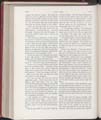
stnic.189008.001.002.jpg clasped her hands in ecstasy. She
forgot her bunch of wool, the difficulty of Tony's breast-feathers, the
impossible sealing-wax leg, and sat listening, enchanted; while the old lady
closed her eyes and swayed back and forth, keeping time with the dreamy
rhythm of the lullaby.
"Why, my dear, you have the voice of an angel!" exclaimed Mam'selle Diane when the child finished. "I must teach you. You must be taught. Mamma, she must be taught. It would be wicked to allow such a voice to go uncultivated!"
"And what can cultivation do that nature hasn't done?" asked the old lady, querulously. "Sometimes I think too much cultivation ruins a voice. Think of yours, Diane; think of what it was before all that drilling and training; think of what it was that night you sang at Madame La Baronne's, when your cousin from France, the Marquis d'Hautreve, said he had never listened to so wonderful a voice."
"It was the youth in it, Mamma, the youth. I was only sixteen:" and Mam'selle Diane sighed over the memory of those days.
"It was before all the freshness was cultivated out of it. You never sang so well afterwards."
"I never was as young, Mamma, and I never had such an audience again. You know, I went back to the convent; and when I came out things had changed, and I was older, and—I had changed. I think the change was in me."
Here a tear stole from the faded eyes that had looked on such triumphs."
It is true, my dear, you never had such an opportunity again. Your cousin went back to France; and—and— there were no more fetes after those days, and there was no one left to recognize your talent. Perhaps it was as much the lack of recognition as anything else. Yes, I say, as I always have said, that it's recognition you need to make you famous. It's the same with your birds as with your singing. It's recognition you need."
"And perhaps it's wealth too, Mamma," said Mam'selle Diane, gently. "One is forgotten when one is poor. Why, we have been as good as dead and buried these twenty years. I believe there's no one left who remembers us."
"No, no, my child, it's not that," cried the old lady, sharply. "We are always d'Hautreves. It was our own choice to give up society; and we live so far away, it is inconvenient,— so few of our old friends keep carriages now; and besides, we have no day to receive. It was a mistake giving up our reception-day. Since then people haven't visited us."
"I was thinking, Mamma," said Mam'selle Diane, timidly, "that if I did as well with my ducks next year as I have this, we might have a day again. We might send cards and let our old friends know that we are still alive."
"We might, indeed," said the old lady, brightening visibly. "We are always d'Hautreves"; then her face fell suddenly. "But, Diane, my dear, we haven't either of us a silk dress, and it would never do for us to receive in anything but silk."
"That's true, Mamma. I never thought of that. We may not be able to have a day after all," and Mam'selle Diane bent her head dejectedly over the sealing-wax and wool.
While these reminiscences were exchanged by the mother and daughter, Lady Jane, whose singing had called them forth, slipped out into the small garden, where, amid a profusion of bloom and fragrance, she was now listening to the warbling of a canary whose cage hung among the branches of a Marechal Niel rose. It was the bird whose melody had enraptured her while she was yet without the paradise, and it was the effigy of that same bird that she had seen on Mam'selle Diane's green woolen trees. He was a bright, jolly little fellow, and he sang as if he were wound up and never would run down.
Lady Jane listened to him delightedly while she inspected the beds of flowers. It was a little place, but contained a great variety of plants, and each was carefully trained and trimmed; and under all the seedlings were laid little sheets of white paper on which some seeds had already fallen.
Lady Jane eyed the papers curiously. She did not know that these tiny black
seeds added yearly a few dollars to the d'Hautreve revenues, and at the same
time furnished the thrifty gardener with all she needed for her own use. But
whose hands pruned and trained, dug and watered? Were they the hands of the
myth of
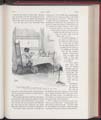
stnic.189008.001.003.jpg a servant who came so early,
before Madame was out of bed,— for the old aristocrat loved to sleep
late,—to clean the gallery and banquette and do other jobs unbecoming
a d'Hautreve?
Yes, the very same; and Mam'selle Diane [illustration - "'Yes, Lady dear, I want you to learn to play on the piano, and I'll tell you what I've been thinking of,' said Pepsie."] was not an early riser because of sleeplessness; nor was it age that made her slender hands so hard and brown.
When Mam'selle Diane rejoined Lady Jane in the garden she had gained her mother's consent to giving the child a music-lesson once a week. The old lady had been querulous and difficult; she had discussed and objected; but finally Mam'selle Diane had overcome her prejudices.
"You don't know what kind of people her relatives are," the old lady said, complainingly. "And if we once open our doors to the child, the aunt may try to crowd in. We don't want to make any new acquaintances. There's one satisfaction we still have, that, although we are poor, very poor, we are always d'Hautreves, and we always have been exclusive, and I hope we always shall be. As soon as we allow those people to break down the barriers between us, they will rush in on us, and, in a little while, they will forget who we are."
"Never fear, Mamma; if the aunt is as well bred as the child, she will not annoy us. If we wish to know her we shall probably have to make the first advances, for, judging by the child, they are not common people. I have never seen so gentle and polite a little girl. I'm sure she'll be no trouble."
"I don't know about that; children are natural gossips, and she is very intelligent for her age. She will notice everything, and the secret of your birds will get out."
"Well, Mamma dear, if you feel that she will be an intrusion upon our privacy I won't insist; but I should so like to have her, just for two hours, say, once a week. It would give me a new interest; it would renew my youth to hear her angelic little voice sometimes."
"Oh, I suppose you must have your way, Diane, as you always do. Young people nowadays have no respect for age. We must yield all our traditions and habits to their new-fashioned ideas or else we are severe and tyrannical!"
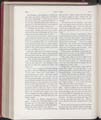
stnic.189008.001.004.jpg
Oh, Mamma— dear Mamma—I'm sure you are a little, just a little, unkind now," said Mam'selle Diane, soothingly. "I'll give it up at once if you really wish it; but I don't think you do. I am sure the child will interest you; besides, I 'm getting on so well with the bird. You wouldn't have me give up my model, would you?"
"Certainly not, my dear. If you need her, let her come. At least, you can try for a while; and if you find her troublesome, and the lessons a task, you can stop them when you like."
When this not very gracious consent was obtained, Mam'selle Diane hastened to tell Lady Jane that if her aunt approved she could come to her every Saturday from one to three, when she would teach her the piano, as well as singing; and that after the lesson, if she liked to remain awhile in the garden with the birds and flowers she was at liberty to do so.
Lady Jane fairly flew to tell Pepsie the good news; but, much to her surprise, her merry and practical friend burst into tears, and hid her face on the table among the pecan-shells.
"Why, Pepsie,—dear, dear Pepsie,—what ails you?" cried Lady Jane, in an agony of terror; "tell me what ails you"; and dropping Tony, she laid her little face among the shells, and cried too.
"I 'm—I 'm—jealous," said Pepsie, looking up, after a time, and rubbing her eyes furiously. "I 'm a fool, I know, but I can't help it. I don't want you to go there. Those fine, proud people will teach you to look down on us. We're poor, my mother sells pralines, and the people that live behind that green fence are too proud and fine to notice any one in this street. They've lived here ever since I was born, and no one's seen them, because they've kept to themselves, always; and now, when I've just got you to love, they want to take you away; they want to teach you to despise—us!" and Pepsie stumbled over the unusual word in her passionate vehemence, while she still cried and sobbed angrily.
"But don't cry, Pepsie," entreated Lady Jane. "I don't love Mam'selle Diane so well as I love you. It's the music, the singing. Oh, Pepsie,—dear, dear Pepsie,—let me learn music, and I'll be good and love you dearly!"
"No, no; you won't; you won't care any more for me," insisted Pepsie, the little demon of jealousy raging to such a degree that she was quite ready to be unjust as well as unreasonable.
"Are you cross at me, Pepsie?" and Lady Jane crept almost across the table to cling tearfully to her friend's neck. "Don't be cross, and I won't go to Mam'selle Diane. I won't learn music, and, Pepsie dear, I'll—I'll— give you Tony!"
This was the extreme of renunciation, and it touched the generous heart of the girl to the very quick. "You dear little angel!" she cried, with a sudden revulsion of feeling clasping and kissing the child passionately. "You're as sweet and good as you can be, and I'm wicked and selfish! Yes, wicked and selfish! It's for your good, and I'm trying to keep you away. You ought to hate me for being so mean."
At this moment Tite Souris entered, and, seeing the traces of tears on her mistress's cheeks, broke out in stern reproachful tones.
"Miss Lady, what's you be'n a-doin' to my Miss Peps'? You done made her cry. I see how she's been a-gwine on! You jes' look out or her ma'll git a'ter you ef yer makes dat po' crooked gal cry dat a-way."
"Hush, Tite," cried Pepsie; "you need n't blame Miss Lady. It was my fault. I was wicked and selfish; I didn't want her to go to Mam'selle Diane. I was jealous, that's all."
"Pepsie cried because she thought I would not love her," put in Lady Jane, in an explanatory tone, quite ignoring Lite's burst of loyalty "Mam'selle Diane is nobility, French nobility; and Pepsie thought I'd be proud and love Mam'selle best, didn't you, Pepsie?"
"Now, jes' hear dat chile!" cried Tite, scornfully. "If dey is nobility, dey is po' white trash. Shore's I live, dat tall lean one, wat look lak a graveyard figger, she git outen her bed 'fore sun-up, an' brick her banquette her own self. I done seed her one mornin'; she war a-scrubbin' lak mad. An' bress yer, honey, she done had a veil on, so no one won't know her. Shore's I live, she done brick her banquette wid a veil on."
"If she cleans the banquette herself they must be very poor," was Pepsie's
logical conclusion." Perhaps, after all, they're not so proud; only
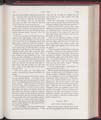
stnic.189008.001.005.jpg they don't want people to know, how
poor they are. And Tite, don't you tell that on the poor lady. You know it's
just one of your stories about her having a veil on. It may have been some
one else. You couldn't tell who it was if she had a veil on, as you say."
This argument did not in the least shake Tite Souris in her conviction that she had seen the granddaughter of the Count d'Hautreve bricking her banquette, before "sun-up," with a veil over her face.
However, Lady Jane and Pepsie were reconciled, and the little cripple, to show her confidence in the child's affection, was now as anxious to have her go to Mam'selle Diane and learn music, as she was averse to it before.
"Yes, Lady dear, I want you to learn to play on the piano, and I'll tell you what I've been thinking of," said Pepsie, as they leaned confidentially toward each other across the table. "Mamma has some money in a bank. She's been saving it to get something for me. You know she does everything I want her to do. I wanted to learn to read, and she had a teacher come to me every day until I could read and write very well, so I'm sure she'll do this if I want her to, and this is what it is: she must buy a piano to put right there in that space next the bed."
"For me to play on? Oh, Pepsie, how lovely!" and Lady Jane clasped her hands with delight.
"And you can practice all the time," continued the practical Pepsie. "You know, if you ever learn music well you must practice a great deal. Cousin Marie practiced three hours a day in the convent. And then, when you're grown up, you'll sing in the Cathedral and earn a great deal of money; and you can buy a beautiful white satin dress, all trimmed down the front with lace, and they'll ask you to sing in the French opera, on Rue Bourbon, and every one will bring you flowers and rings and bracelets and jewels, and you'll be just like a queen."
"And sit on a throne and wear a crown," gasped Lady Jane, her eyes wide and sparkling, and her cheeks flushed, over the glories of Pepsie's riotous imagination.
"Yes," said Pepsie. Now that she had started she meant to give full rein to her fancy. "And every one will be ready to worship you, and you'll ride out in a blue carriage with eight white horses."
"Oh, oh!" interrupted Lady Jane, rapturously; "and you'll go with me, and it'll be just as good as riding in Tante Modeste's milk cart!"
"Better, much better," agreed Pepsie, quite willing, in her present mood, to admit that there was something better; "and then you'll have a big, big house in the country, with grass and trees and flowers, and a fountain that will tinkle, tinkle, all the time."
"And you and Mamma Madelon will live with me always." Here a sudden shadow passed over the bright little face and the wide eyes grew very wistful, "And, Pepsie, perhaps God will let Papa and Mamma come and live with me again."
"Perhaps so, dear," returned Pepsie, with quick sympathy. "When I say my prayers, I'll ask." Presently Lady Jane said softly, with an anxious glance at Pepsie, "You know, you told me that Mamma might come back before Christmas. It's nearly Christmas, isn't it? Oh, I wish I could know if she was coming back! Can't you ask your cards, Pepsie? Perhaps they'll tell if she'll come."
"I'll try," replied Pepsie; "yes, I'll try; but sometimes they won't tell."
When Lady Jane asked permission of Madame Jozain to study music with Mam'selle Diane, "Tante Pauline" consented readily. In fact, she was overjoyed. It was no common honor to have her "niece" instructed by a d'Hautreve, and it was another feather in her much beplumed cap. By and by people would think more of her, and treat her with greater consideration. When she was once intimate with the d'Hautreve ladies, the neighbors wouldn't dare turn the cold shoulder to her; for through their interest in the child she expected to gain a foothold for herself; but she had yet to learn how very exclusive a d'Hautreve could be under certain circumstances.
CHAPTER XIV.
LADY JANE'S DANCING-MASTER.
AMONG all Lady Jane's friends, there was no one who congratulated her on her
good fortune
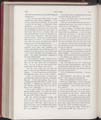
stnic.189008.001.006.jpg with half the enthusiasm
and warmth displayed by little Gex.
"Vell, vell, my dear leetle lady," he said, rubbing his small hands delightedly. "Vhy, you are in luck, and no mistake! To have such a teacher for the music as Mam'selle Diane d'Hautreve is as good as a fortune to you. She'll give you the true style—the style of the French nobility, the only style vhat is good. I know just vhat that is. Peoples think old Gex knows nothing; but they're mistaken, letle lady; they're mistaken. They don't know vhat I vas once. There isn't nothing in music that Gex hasn't heard. I've seen everything fine, and I've heard everything fine, vhen I used to be alvays at the French opera."
"Oh, were you in the French opera?" interrupted Lady Jane, with sparkling eyes; "that's where Pepsie says I shall sing; and I'm going to have flowers, and—and a throne, and—oh, I don't remember, but everything, everything!" she added, impressively, summing all up in one blissful whole.
"Vell, I shouldn't vonder, I shouldn't vonder," said Gex, looking at her proudly, with his head on one side, much like an antiquated crow, "for you've got the voice already vhat vould make soft the heart of one stone."
"Oh, Mr. Gex, where did you hear me sing?" and Lady Jane looked at him with grave surprise. "I never sang for any one but Pepsie, and Mam'selle Diane, and you weren't there."
"But I've heard you sing, I've heard you, my leetle lady," insisted the old man, with twinkling eyes. "It vas one morning, vhen you vas a-singing vith Mam'selle Diane, outside on the banquette. I stepped out, and there I heard you sing like one leetle bird; but you didn't know I vas a-listening."
"No, I didn't know it," said Lady Jane, smiling brightly again. "I 'm glad you heard me, and some day I'll sing 'Sleep, baby, sleep' for you, if you'd like to hear it."
Mr. Gex assured her that he would, and added that he adored music. "I haven't heard the fine music for many years," he remarked, with a little sigh, "and I used to be just crazed for it; but I vas different then, leetle lady, I vas different; you vouldn't think it, but I vas different."
"You didn't, wear a handkerchief over your ears then, did you, Mr. Gex?"
"No, no, my leetle lady; it vas the ear-ache vat made me tie up my ear."
"Did you wear an apron, and did you sew?" continued Lady Jane, very curious to know in what ways he was different.
"Vear an apron!" exclaimed Gex, holding up his hands. "Vhy, bless your leetle heart, I dressed like one gentleman. I vore the black clothes, fine and glossy. I vas one neat leetle man. My hair vas black and curly, and you von't believe it, I'm afraid you von't believe it, but I vore the silk hose, and leetle fine shoes tied vith one ribbon, and one gold chain across my vaistcoat; and one ring on that finger," and Gex touched one of his hard and shrunken digits by way of emphasis.
"Did you, Mr. Gex—oh, did you?" and Lady Jane's eyes glistened, and her little face was one smile of delight. "Oh, how nice you must have looked. But you didn't have a fruit stall, then?"
"No, indeed; no, indeed; I vas in one fine business. I vas fashionable then; I vas one fine leetle gentleman."
"Mr. Gex, what did you do?" cried Lady Jane, in a little shrill impetuous voice, for her curiosity had reached the climax. "I want to know what you did when you curled your hair and wore a gold chain."
"I vas one professeur, leetle lady. I vas one professeur."
"One professeur! Oh, what is 'one professeur'?" cried Lady Jane, impatiently.
"He is one gentleman vhat does teach."
"Then you taught music. Oh, I've guessed it, you taught music," and Lady Jane looked at him admiringly. "Now I know why you like it so much!"
"No, no, leetle lady. It vas not the music. It vas the sister to the music; it vas the dance. I vas professeur of the dance. Think of that, of the dance. So nimble, so quick; see, like this," and little Gex, carried away by the memory of his former triumphs, took hold of the sides of his apron and made two or three quaint fantastic steps, ending them with a little pirouette and low bow which enchanted Lady Jane.
"Oh, how funny, how funny! Please do it again, won't you, Mr. Gex ? Oh, do, do!"
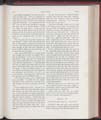
stnic.189008.001.007.jpg
Gex smiled indulgently, but shook his head. "No, no, leetle lady. Once is enough, just to show you how nimble and quick one professeur of the dance can be; but then I vas young and supple and full of life. I vas running over with life; I vas one fine leetle gentleman, so springy and light, and I vas all the fashion. Vould you believe it, leetle lady? I had one fine grand house on Rue Royale, and all the rich peoples, and all the noblesse, and all the leetle gentlemen and the small leetle ladies like you came to the 'Professeur Gex' to learn the dance."
"But why, why, Mr. Gex, did you leave the Rue Royale?" asked Lady Jane, greatly puzzled at his changed condition, and anxious to know by what strange freak of destiny he had been brought to sell fruit and vegetables in Good Children Street, to wear an apron, and to mend his own stockings.
"Ah, vell, my leetle lady, it vas many things vhat brought me to here," he replied, with a sigh of resignation. "You see I did not stay the fashion. I got old, and the rheumatism made me slow and stiff, and I vas no more such a fine, light leetle gentleman. I could not jump and turn so nimble and quick, and a new professeur came from Paris, and to him vent all my pupils. I had no money, because I vas vairy fond of good living, and I lived high like one gentleman; and so, vhen I vas old I vas poor, and there vas nothing but to sell the fruit and vegetable in Good Children Street."
"Oh, dear, dear, what a pity!" sighed Lady Jane, regretfully. To think that the mighty had fallen so low touched her loyal little heart, and brought the tears of sympathy to her blue eyes.
"Naiver mind, naiver mind. You see I vas old and I could not teach the dance alvay; but attendez, my leetle lady, listen to vhat I say," and he clasped his hands persuasively, and turned his head on one side, his little twinkling eyes full of entreaty. "Vould you, now vould you, like to learn the dance? I'm old, and I'm no more so nimble and light, but I know the steps, all the fine steps, and my leetle lady must learn the dance some time. Von't you let me teach you how to take the fine leetle steps?"
"Oh, Mr. Gex, will you?" cried Lady Jane, jumping down from her chair, with a flushed, eager face, and standing in front of the little dancing-master. "Do, do! I'm all ready. Teach them to me now!"
"Vell, that is all right; stand as you are and I vill begin just now," said Gex, beaming with pleasure, while he hurriedly grasped the sides of his loose trousers and pushed his spectacles well on the top of his bald head. "Now, now, leetle lady, turn out your toes, take hold of your skirt; just so. Right foot, left foot, just so. Vatch me. Right foot, left foot. One, two, three! Right foot, one, two; left foot, one, two, three; half around, one, two, three; just so, vatch me! Back again, half around, one, two, one, two; ah, good, good, vairy good, my leetle lady! You vill learn the dance so vell!"
It was a delicious picture that they made in the dingy little shop, surrounded by fruit and vegetables. Lady Jane, with her yellow, flying hair, her radiant rosy face, her gracious head cquettishly set on one side, her sparkling blue eyes fixed on Gex, her dainty little fingers holding out her short skirt, her slender, graceful legs, and tiny feet advancing and retreating in shy mincing steps, turning and whirling with a pretty swaying motion first one side, then the other, right in front of Gex, who, with a face of preternatural gravity, held out his loose trousers' legs and turned his small shoes to the correct angle, while he went through all the intricate steps of a first dancing-lesson in the quaint, old-fashioned style of fifty years ago; every movement being closely followed by the child with a grace and spirit really charming.
When the lesson was over and Lady Jane ran to tell her friend of this latest stroke of good fortune, Pepsie showed all her white teeth in a broad smile of satisfaction.
"Well, Lady," she said, "you are a lucky child! You've not only found a music-teacher, but you've found a dancing-master!"
CHAPTER XV.
LADY JANE MEETS WITH AN ADVENTURE.
CHRISTMAS came and went; and whatever hopes, desires, or regrets, filled the
loving little heart of Lady Jane, the child kept them to herself,
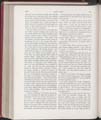
stnic.189008.001.008.jpg and was outwardly as bright and
cheerful as on other days, although Pepsie, who watched her closely, thought
that she detected a wistfulness in her eyes, and, at times, a sad note in
the music of her happy voice. If the affection that finds expression in
numerous Christmas gifts can make a child contented, Lady Jane had certainly
no reason to complain.
The first thing on which her eyes fell when she awoke was her stockings, the slender legs very much swollen and bulged, hanging in Madame's chimney-corner, waiting to be relieved of their undue expansion. Even Raste—the extravagant and impecunious Raste— had remembered her; for a very dressy doll, with a French gilt bangle encircling its waist (the bangle being intended not for the doll, but for Lady Jane), bore a card on which was inscribed in bold characters, "M. Adraste Jozain," and, underneath the name, "A mery Crismus." Adraste was very proud of his English, and as Lady Jane was more grateful than critical it passed muster. Then, there was a basket of fruit from Gex; and beside the basket nestled a little yellow duckling, which came from Mam'selle Diane, as Lady Jane knew without looking at the tiny old-fashioned card attached to it. And, after she had been made happy at home, she still had another pleasure in store; for Pepsie, wishing to witness the pleasure of her little friend, had the Paichoux presents, with her own and Madelon's, beautifully arranged on her table, and carefully covered until the important moment of unveiling. Every Paichoux had remembered Lady Jane, and a finer array of picture-books, dolls, and toys was never spread before a happier child; but the presents which pleased her most, were a small music-box from Madelon, a tiny silver thimble from Pepsie, and Mam'selle Diane's little duckling. These she kept always among her treasures.
"The day I like best," said Pepsie, after Lady Jane had exhausted all adjectives expressive of admiration, "is the Jour de l' An, New Year's, as you call it. Then Tante Modeste and the children come, and bring bonbons and fireworks, and the street is lighted from one end to the other, and the sky is full of rockets and Roman candles, and there is so much noise, and every one is merry—because the New Year has come."
At that moment, Tite Souris entered with an expressive grin on her ebony face, and an air of great mystery.
"Here you, chil'ums, I done got yer Crismus. Doan' say nufin' 'bout it, 'cause tain't nufin' much. I ain't got no money ter buy dolls, an' sech; so I jes' bought yer boaf a 'stage plank.' I lowed yer might lak a 'stage plank.'"
Unfolding a large yellow paper, she laid a huge sheet of coarse black gingerbread on the table among Lady Jane's treasures.
"Thank you, Tite," said Lady Jane, eying the strange object askance. "What is it?"
"Oh, lor', Miss Lady, ain't ye neber seed a 'stage plank'? It's ter eat. It's good; ain't it, Miss Peps'?"
"I don't know, Tite; I never ate one," replied Pepsie, smiling broadly; "but I dare say it's good. It's kind of you to think of us, and we'll try it, by and by."
"Dear me!" said Pepsie, after Tite, who was grinning with satisfaction, had left the room. "What shall we do with it? We can't eat it?"
"Perhaps Tony will," exclaimed Lady Jane, eagerly. "He will eat almost anything. He ate all Tante Pauline's shrimps the other day, and he swallowed two live toads in Mam'selle Diane's garden. Oh, he's got a dreadful appetite! Tante Pauline says she can't afford to feed him," and she looked anxiously at her greedy pet.
"Well, we'll try him," said Pepsie, breaking off a piece of the "stage plank" and throwing it to Tony. The bird gobbled it down promptly, and then looked for more.
Lady Jane clapped her hands delightedly. "Oh, isn't Tony nice to eat it? But we mustn't let Tite know, because she'd be sorry that we didn't like it. We'll keep it and give it all to Tony." And in this way Tite's "stage plank" was disposed of.
If Christmas was a merry day to Lady Jane, New Year's was certainly a happy
one. The Paichoux children came, as Pepsie said they would, loaded with
bonbons and fireworks, and all day the neighborhood was lively with their
fun—and such a dinner as they brought with them! Lady Jane thought
there never could be anything as pretty as the table in Madelon's little
room, loaded, as it was, with all sorts of
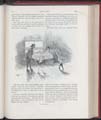
stnic.189008.001.009.jpg good things. Tante Modeste went home
to dine with her husband; but the children remained until the milk-cart came
for them, when it was quite dark.
After they were all gone, and quiet was restored to the tiny dwelling, Lady Jane remarked to Pepsie that she thought New Year's was better than Christmas.
"But just wait," said Pepsie, smiling mysteriously; "just wait until Carnival! Christmas and New Year's are lovely; but Mardi-Gras—oh, Mardi-Gras! there's nothing like it in the world!"
Lady Jane wondered very much what Mardi-Gras was; but tried to wait patiently until that wonderful day should arrive. The time did not pass slowly to her, surrounded as she was by tender care and affection.
Pepsie was teaching her to read and sew, and Mam'selle Diane was drilling her in scales,—although at times Madame d'Hautreve grumbled and quavered about the noise, and declared that the child was too young; for, stretch them all she could, her tiny fingers would not reach an octave.
And then there were the dancing lessons, which were always a pleasure, and a constant source of amusement in which Pepsie and Tite Souris shared, Pepsie as an enraptured spectator, and Tite Souris by personating Mr. Gex in Lady Jane's frequent rehearsals; and even Tony had caught the spirit of Terpsichore, and under Lady Jane's constant instruction had learned to take steps, to mince and hop and pirouette, if not as correctly, at least as gracefully, as the ancient Professor Gex.
(To be continued.)